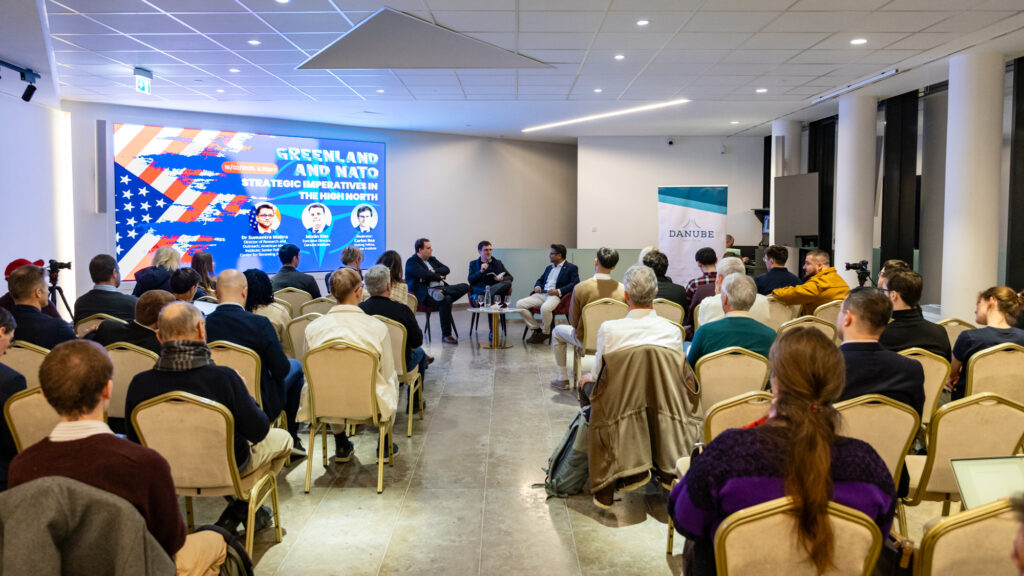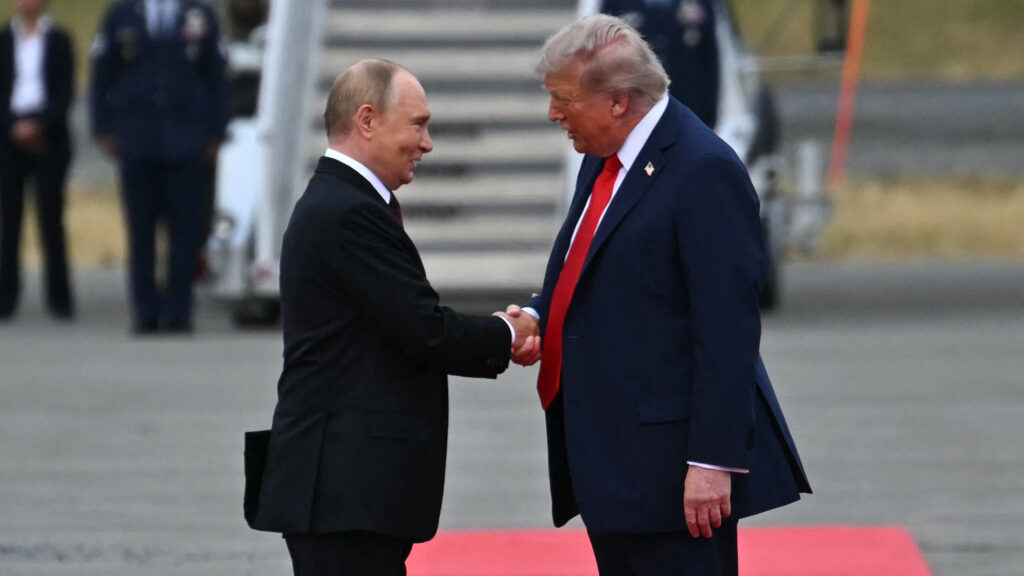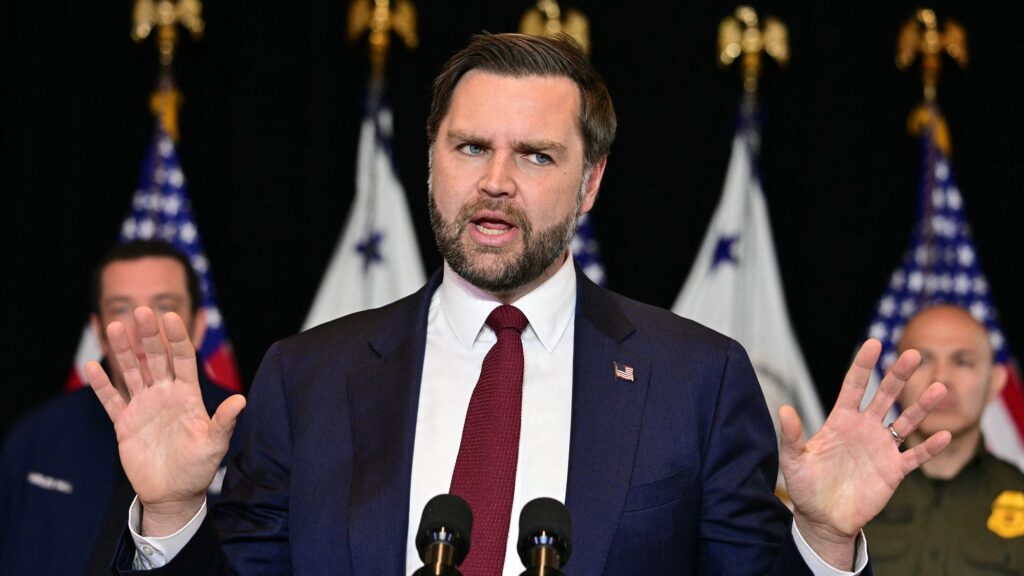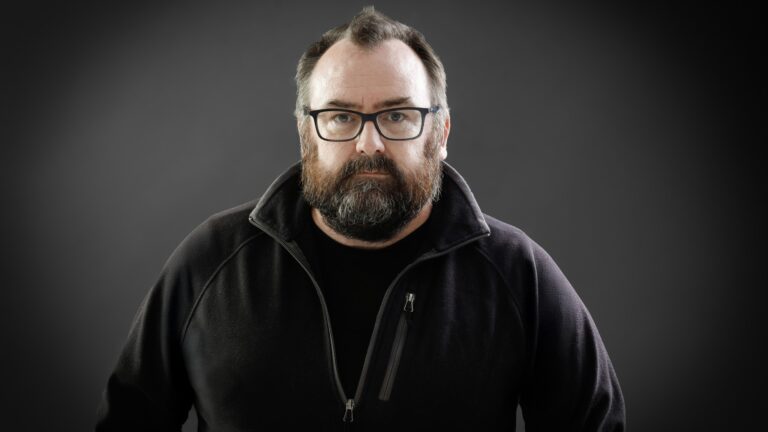Sumantra Maitra, Director of research and outreach at the American Ideas Institute and a leading analyst of NATO strategy, European security, and great-power politics, visited Budapest to participate in a panel discussion organized by the Danube Institute on Donald Trump’s efforts to purchase Greenland, the island’s strategic importance for NATO, its role in shaping NATO’s Arctic strategy, and relations between the US and the European Union. Maitra sat down with Hungarian Conservative for a broader conversation on US foreign policy under Trump 2.0 and the European reactions to it.
***
Long before his inauguration and even afterward, Donald Trump made statements about the US potentially purchasing Greenland from Denmark—comments that sent the EU into a frenzy. What was the ultimate goal of Trump’s statements?
Well, peaceful expansion is part of American history. It’s an American ethos. It’s always been the American case. The US expanded by buying territories like Alaska and Louisiana. The last time America actually bought something was from Denmark in 1917—what’s now known as the Virgin Islands. So, by that logic, it makes sense that the US would be interested in expanding its territory. But there’s also a structural argument for it.
Greenland is three times the size of Texas—it’s a huge landmass. Geographically, it’s in the Western Hemisphere, so in a sense, it’s an American island, even though it’s part of Europe. It doesn’t have a large population, but its location is strategically important, especially with the Arctic sea route becoming more relevant. As we enter an era where balancing China and Russia is increasingly crucial, Greenland’s significance is only going to grow. Plus, Greenland has rare earth minerals, which are essential.
If you talk to Greenlanders, many are interested in American investment. Some also see the US as a potential ally in helping them gain independence from Denmark. Now, some of the things Trump says—or the way he says them—are obviously different because he’s Trump. But the core idea is about establishing a foothold and creating a new balance: the US would secure its interests in the Arctic while offering European allies protection against Russian or Chinese influence in the region. In return, the US would gain access to military bases and mining opportunities in Greenland. So, there’s a deal to be made. How that happens remains to be seen, but the logic behind it is clear.
In light of this, how can we explain the somewhat aggressive reactions of European leaders?
I think that’s a little bit of an overreaction from Europe. I think there is also a little cultural difference in how Europeans talk, and Americans talk. Sometimes, Europeans don’t really understand the American sense of humour. Americans are more Anglo–British in a way. They talk in a different way. They’re Americans. I think some of the things I can understand—they’re panicking and taking every single thing that’s coming out of the White House as something troublesome. But basically, they have to understand that it’s actually a mutually beneficial thing if America is based in Greenland.
‘Think of Greenland being an American naval base—that’s one of the biggest advantages that Europe can have’
Europeans are constantly talking about America not leaving the European continent and wanting to keep NATO in place. Think of Greenland being an American naval base—that’s one of the biggest advantages that Europe can have. If there are American investments in Greenland and technological companies, Europeans can go and work there. So, there is a mutually beneficial thing that can happen between Europe and America. The location of the place is not important. The location of the place is actually perfectly placed to find a new balance between the Europeans and the Americans.
So I think some of them—I would want them to relax a little bit. There are different ways people talk, but see what they’re actually trying to do or what they’re trying to achieve. And you’d find there are a lot of mutually beneficial relationships that can happen in Greenland.
Last week, Pentagon Chief Peter Hegseth announced that Washington is effectively withdrawing from Europe to focus on threats closer to its borders. This obviously refers to China, but can we relate Greenland’s case to this as well?
I think, first of all, I would recategorize your statement about America leaving Europe. I don’t think that’s happening. I do think the Americans have been constantly talking about a more burden-shared approach. I think there are various theories on how to achieve that burden-sharing. But the basic idea is, one, if the Europeans think it’s an equal relationship, then they need to step up when it comes to defending the continent. Two, if the Europeans don’t see it as a special relationship and view the Americans as the big superpower, then they should allow the Americans to use the land to the advantage of both Europeans and Americans. So, I think there’s logic in both perspectives. Like, fine, I’m happy to listen to you if you come to the table as an adult. But if you’re not, then let me handle it because what I’m going to do is going to be good for both of us. So that’s point number one.
The second thing is that Greenland is important because of its rare earth minerals. If you look at global trends, a lot of that revolves around how the Chinese are exploiting mineral rights in Africa, for example. A simple way to solve that problem is for the American military-industrial base to stop buying minerals from countries that aren’t allies—like in Africa—or in case there’s a conflict in Taiwan in the future. Instead, there needs to be business transactions with allies. Denmark and Greenland are ultimately Europeans and allies. So if tomorrow the Americans invest in Greenland and American companies handle the mining, it benefits both the people living in Greenland, those coming from Denmark to work there, and the Americans. And all of that happens within the Euro–American sphere, within the Atlantic. So I think that’s a good thing.

Instead of competing with China in Africa, if the US can source rare earth minerals from Greenland, it’s a win-win. Greenland has various types of rare earth minerals—cerium, lanthanum, metals like cobalt. All of these are essential. Just look around, in Roombas, fridges, cars—everything needs chip manufacturing. And where do the rare earth minerals for those chips come from? Greenland. So I think the next 20, 25, or 30 years are going to be huge because there’s going to be massive investment in these resources.
The Europeans, due to their regulations, aren’t really in a position to invest in that sector. Their focus is more on solar energy and green energy. But the Americans don’t have the same level of regulation, so they can go ahead and invest. I think that’s part of what the administration is thinking. And I don’t think this is just about Trump—I think it’s going to be bipartisan. No matter who comes to power, they’re going to focus on Greenland, they’re going to focus on the Western Hemisphere, and they’re going to focus on rare earth minerals. Those priorities aren’t going to change.
There were also accusations of imperialist traits in Trump’s foreign policy regarding Greenland, comparing them to what Russia does in Ukraine or what China might do in Taiwan...
I think if you’re looking at the return of imperialism, then that has already happened. The US is actually the better one because it's not directly going in and taking over places. It’s saying a lot of things, but basically, the idea is: we’re going to come and invest, there’s going to be jobs, and there will be public deals and treaties. What other countries are doing is very different. Azerbaijan goes and takes over parts of Armenia and forces people out. Russia goes into Ukraine and takes over the eastern part of the country. Turkey goes into Syria and takes control. Israel goes into Gaza and takes over. So, imperialism is already here—the post-1945 world is gone.
At least there’s a bit of a difference in how the US approaches it because the US is a republic. There’s no king who can just declare: ‘This is my land, and I’m going to take it.’ So they still try to do it the old-fashioned way—by negotiating, offering money, buying, and setting up companies. Other countries are simply sending their militaries in and taking over.
If we look at US foreign policy under the current administration, we can identify at least three dimensions: one that is obviously Donald Trump, another is JD Vance—just take Munich, for example—and the third is Marco Rubio. How do you see US foreign policy based on the past month’s experience, focusing on NATO and EU?
I think it’s still mostly the same. Americans tend to understand their interests a lot better—it’s just the way those interests are framed. The language might change, but the core interests remain the same. I do think what JD Vance said—and I was in Munich when he said it—was very important, and he’s right.
The key point we need to keep in mind is that, for the past 20 to 25 years, Europeans have repeatedly described NATO as an alliance of shared values and common principles. If you believe that, then you have to ask: what exactly are those shared values with the United States? If you don’t believe that, then the answer is straightforward: it’s not an alliance of shared values—it’s an alliance of interests. And what defines an alliance of interests? Geography. The US sees Europe—particularly Western and Central Europe, though less so Eastern Europe—as strategically important. Washington doesn’t want Western and Central Europe to fall under a rival hegemon, so it commits to defending those regions from any threat. It’s a simple calculation: if Western and Central Europe were to fall, an adversary would gain industrial capacity, manpower, and the ability to threaten the Atlantic. Geography is what matters.
If you remove the interest and geography components and say it’s an alliance of values, then you have to recognize that the conversation about values is usually driven by Europeans, not Americans. For example, when the US Supreme Court overturned Roe v Wade, it was European heads of state and government—from Denmark, France, Germany, and others—who publicly criticized the decision. The issue is that when European leaders comment on American domestic politics, they inevitably take sides. And when they take one side, the other side gets frustrated—which is exactly what’s happening now. So when American leaders come to Europe, they’re saying: ‘Listen, we’re the ones providing your security. We’re the largest contributor to NATO. What shared values are we talking about? We’re the ones who still go to church, and you don’t. What shared values are we supposed to have?’

The values question is always tricky. That’s why, in the past, people avoided focusing on values—it didn’t matter what values you held; if you were a Western European country, the US would defend you regardless. The same goes for Turkey. Turkey doesn’t share many values with the US, but it’s strategically important, so the US will defend it. But the moment you start emphasizing shared values, the other side will question you: ‘What values are we talking about?’
Americans believe in free speech. It’s like Ronald Reagan’s old joke: In America, you can go to the White House, shake your fist, and say: ‘I don’t like the way the American government runs this country.’ And the Soviet guy responds: ‘We can do that too—we can go to the Kremlin and say, “I don’t like the way the American government runs its country.”’ But the point is: if free speech is the shared value, then there has to be genuine free speech. Europeans can’t expect the US to defend them while simultaneously fining American companies like X. That’s not going to fly.
And if Europeans think they can send troops to Greenland, that would violate the Monroe Doctrine—that’s an act of war, and it’s not going to happen. But ultimately, I think Europeans are mature adults. It’s better to have a clear, honest understanding of where the boundaries are rather than pretending everyone is one big happy family. Sometimes, we have differences of opinion—and it’s perfectly fine to acknowledge that in public.
Just for curiosity...what was the reaction on the ground for JD Vance’s speech in Munich?
Well, you guys know better than me. I loved it. I don’t think some of the people in Munich did, but I also don’t think that matters. It’s the reality, and someone had to say it.
Indeed. My last question takes us back to Greenland: if the US cannot buy the land in the coming years, could Europe defend it from external threats like China or Russia?
Well, defend with what troops? You answered your own question. No, I don’t think the Europeans can defend Greenland from Russia or China. I don’t think they’ve got the capability. I also don’t think they’ll be able to figure out what troops to send because they’re not united. The European Union isn’t a unified power—it’s not consistent. I mean, look at what’s happening in Ukraine. They met in Paris, and they still couldn’t decide what to do—that’s just how things are.
But I also don’t think there’s going to be any conflict with America over Greenland. The Americans aren’t planning to go to war over Greenland—they want to invest and make money. They don’t want a conflict with Europe. And I don’t think the Europeans should want a conflict with America either because, at the end of the day, there are much bigger threats in Russia and China that they need to worry about. So, I think everything is going to be fine.
Related articles:







